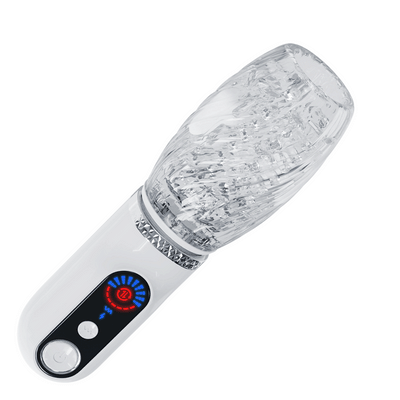Premature ejaculation
Premature ejaculation refers to the occurrence of ejaculation with minimal stimulation, either before, during, or immediately after penetration. It can result from psychological causes or heightened sensitivity. At Touch Honey, we offer solutions for premature ejaculation.
What is the premature ejaculation?
Various health institutions dedicated to the study of sexual health have developed definitions of premature ejaculation, and these descriptions consistently revolve around three primary factors: Intravaginal ejaculatory latency time (IELT), lack of control, and sexual dissatisfaction.
According to the International Society of Sexual Medicine (ISSM), they define premature ejaculation as a sexual dysfunction characterized by the occurrence of ejaculation always or almost always before or within about one minute after vaginal penetration, coupled with an inability to delay ejaculation on all or almost all vaginal penetrations. This condition is associated with negative personal consequences such as anguish, annoyance, frustration, and the reluctance to engage in sexual intimacy.
Despite affecting between 25% and 40% of men, premature ejaculation is one of the least consulted problems in comparison to erectile dysfunction. This is often due to feelings of shame or fear of acknowledging the issue. Additionally, premature ejaculation can lead to emotional challenges for both the affected individual and their partner.
It's worth noting that, in many cases, premature ejaculation can be effectively treated with various methods, including treatments, medications, and exercises that help individuals gain better control over their ejaculation.
Types of premature ejaculation
There are two defined types of premature ejaculation that can occur in men:
- Primary (lifelong): Primary premature ejaculation is the type that occurs every or nearly every time an individual engages in sexual activity.
- Secondary (acquired): This type of premature ejaculation manifests itself after an individual has had previous sexual experiences without ejaculatory problems.
How do I know if I am a premature ejaculator?
If you occasionally experience premature ejaculation, it's typically not a cause for concern. However, if this issue occurs regularly, you may be dealing with a certain degree of premature ejaculation. There are several symptoms that can generally indicate whether you might be a premature ejaculator:
- Involuntary ejaculation during foreplay.
- Ejaculation before initiating penetration.
- Ejaculation shortly after penetration (typically within less than 1 minute).
- Avoidance of sexual encounters due to fear of not being able to control ejaculation.
- Your partner experiencing difficulty reaching orgasm.
- Experiencing discomfort, and at times, anxiety and stress due to these issues.
If you recognize some of these symptoms in your sexual experiences, you may indeed be dealing with premature ejaculation. However, there's no need to be overly alarmed because, as mentioned earlier, most cases of premature ejaculation can be effectively treated.
To receive a reliable diagnosis and determine your specific case, it is advisable to consult a doctor who specializes in male sexuality. They can conduct the necessary medical and psychological assessments to provide a thorough evaluation and tailored treatment options.
Tests for Diagnosing Premature Ejaculation
- Complete Clinical History: The patient should openly and honestly discuss the issue with the doctor, providing a comprehensive account of their problem. This allows the doctor to objectively evaluate the information. Additionally, it is advisable to administer a questionnaire or test recommended by scientific societies to diagnose and measure the degree of premature ejaculation.
- Analytical Tests: These tests are essential for assessing hormonal levels and checking for the presence of possible infections. A complete physical examination is also conducted to rule out or confirm any potential connection with erectile dysfunction.
- Ultrasounds or CT Scans: If the diagnosis remains unclear after the previous tests, imaging tests such as ultrasounds or CT scans may be performed to examine the condition of the prostate and the primary glands that could be contributing to hormonal disorders.
These tests are crucial for a comprehensive evaluation of premature ejaculation, and they help healthcare professionals determine the underlying causes and the most appropriate treatment options for the patient.
Causes of premature ejaculation?
Premature ejaculation can occur in a man due to a variety of physical and/or psychological causes. Here are some of the most significant factors that can contribute to this issue:
Biological Cause: Premature ejaculation is believed to result from an alteration in the sensitivity of the brain's serotonin receptors.
In addition to the biological cause, several factors may trigger or exacerbate premature ejaculation:
- Anxiety and Stress
- Fear or Nervousness
- Depression
- Bipolar Disorder or Post-Traumatic Stress Disorder
- Infections of the Urinary Tract or Prostate
- Alcoholism and Smoking
- Substance Abuse (Drug Use)
- Neurological Disorders, including conditions such as neurosyphilis, spinal cord sclerosis, and neuropathies
- Hormonal Disorders, including defects in the thyroid and adrenal glands
- Infrequent Sexual Relations
Understanding these potential causes can help individuals and healthcare professionals identify the specific factors contributing to premature ejaculation and determine the most suitable treatment approach.
Why is it important to treat premature ejaculation?
It is crucial for individuals to recognize the importance of treating premature ejaculation, as failing to address it in a timely manner can lead to significant psychological and social problems:
- Psychological Problems: Premature ejaculation often leads to anxiety and stress both before, during, and after sexual intercourse. The fear of it happening and the subsequent frustration and shame can cause profound insecurity and, in some cases, even lead to depression.
- Social Problems: Personal relationships can deteriorate as a result of the anxiety, stress, frustration, and insecurity experienced by individuals dealing with premature ejaculation. These issues can strain relationships and impact one's overall quality of life.
As previously mentioned, the majority of cases of premature ejaculation can be treated successfully. Therefore, individuals should not be overly alarmed. Seeking help from a specialist early on in the process is crucial. Short-term benefits are typically observed through appropriate treatment, which can significantly improve both the individual's psychological well-being and their social relationships.

Treatments for premature ejaculators
Currently, there are several treatment options available for premature ejaculation, which can be categorized into medical, surgical, and psychological treatments. In most cases, surgical intervention is not necessary to address premature ejaculation. Typically, a combination of psychological and medical treatments is sufficient to improve ejaculation control. Here are the different approaches:
- Psychological Treatments: In psychological treatments, you work closely with a psychologist to create a comprehensive medical history, allowing for an in-depth understanding of your specific case. From there, you'll engage in exercises, receive tips, and develop new habits that help enhance self-control and extend ejaculation time. These treatments can lead to improvements in your sexual life, self-esteem, and personal confidence.
- Medical Treatments: One medical treatment involves the use of a desensitizing cream. This treatment is administered by a specialist in male sexuality to ensure the correct application of a desensitizing gel, which significantly delays ejaculation. The gels used in this treatment are authorized by the Spanish Agency for Medicines and Health Products (AEMPS).
- Surgical Treatments: A third option involves desensitizing the genital area through a surgical procedure known as selective neurectomy of the penis. This surgery reduces sensitivity by delaying the transmission of the ejaculatory impulse.
It's important to note that the choice of treatment should be made in consultation with a healthcare professional, taking into account individual factors and preferences. Surgery is typically considered a last resort when other treatments have not produced satisfactory results.
Tips to prevent premature ejaculation
Premature ejaculation is a more common issue than one might think, affecting around 30% of the male population. If we consider those who have experienced it occasionally at some point in their lives, this figure can increase to around 50%. Fortunately, there are several exercises that can help prevent premature ejaculation, and when performed correctly, they often yield excellent results. Here are some of these exercises and their benefits:
- Delay Ejaculation: This exercise involves various techniques and strategies aimed at increasing your ability to delay ejaculation during sexual activity.
- Kegel Exercises: Kegel exercises help strengthen the pelvic floor muscles, which can improve ejaculation control and overall sexual function.
- Urination Control: Learning to control the flow of urine by starting and stopping it can help enhance your ability to control ejaculation.
These exercises, when practiced regularly and correctly, can contribute to better ejaculation control, improved sexual performance, and increased satisfaction for both you and your partner. Consulting with a healthcare professional or sex therapist can provide further guidance on how to perform these exercises effectively.
Does your partner suffer from premature ejaculation?
Premature ejaculation is a prevalent issue in intimate relationships. When it occurs, it can affect an individual's self-esteem, leading to anxiety and fear of recurrence. The problem intensifies when it becomes a recurring issue, causing discomfort in the relationship.
Many men who face premature ejaculation may not openly discuss it. It is advisable for both partners in the relationship to actively engage in resolving this sexual problem.
One of the most critical first steps is to talk about the issue, whether with your partner, friends, or family. Communication is vital with those you trust, as it allows them to provide support and assistance. In the case of a couple, discussing the matter can lead to understanding and a joint effort to address the problem.
Seeking a solution is crucial. In today's era, there are permanent solutions for premature ejaculation. Taking the initiative and looking for these solutions is a courageous step toward reclaiming a satisfying sex life. Consulting a specialist is often the most effective way to permanently address premature ejaculation.
Most common causes of premature ejaculation
Premature ejaculation: Causes and solutions
Premature ejaculation can have various causes, primarily related to a loss of control over the ejaculatory reflex. This loss of control can prevent the full enjoyment of sexual encounters and, in some cases, may even make penetration difficult.
To address premature or sudden ejaculation, clinics and hospitals offer top-notch treatments in the field. The specialists possess extensive experience in these procedures, resulting in definitive outcomes. The most prominent methods for treating premature ejaculation include:
- Medical Treatment
- Surgical Treatment
- Psychological Treatment
These approaches are tailored to address the specific causes and needs of individuals experiencing premature ejaculation, offering them effective solutions to enhance their sexual experiences.
Why do I have premature ejaculation?
If you're looking for a straightforward answer to this question, generally, premature ejaculation may be attributed to psychological issues.
Rapid or sudden ejaculation often prompts individuals to question whether they have a form of sexual dysfunction. This concern is particularly common among young people and is often linked to habits acquired during early masturbation experiences. These habits can lead to a rush to climax and a desire to achieve maximum pleasure as quickly as possible.
Specialized clinics in male sexual health emphasize the main causes that typically lead to premature ejaculation in men. Initially, it was primarily associated with psychological factors like anxiety or stress. However, today, experts acknowledge that it results from an interaction between physiological and psychological factors. This understanding reflects a more comprehensive view of the condition.
Physiological causes
Premature ejaculation often occurs due to the brain's quick response to a stimulus, particularly excessive excitement, leading to reaching the peak of pleasure and ejaculation. The following are common physiological causes that typically lead to premature ejaculation in men:
- Hypersensitivity of the Glans: The level of sensitivity of the glans (the head of the penis) can vary from person to person. Some studies have linked premature ejaculation to an excess of sensitivity, which can also be caused by conditions like phimosis (a tight foreskin), infections, or penile trauma.
- Erectile Dysfunction: Individuals who struggle with obtaining and maintaining erections may develop a premature ejaculatory response as they aim to conclude sexual intercourse before their erection wanes. Pressure, embarrassment, or anxiety about a situation can exacerbate this response.
- Abnormal Hormonal Levels: Abnormal levels of hormones, such as decreased testosterone or thyroid disorders, can contribute to premature ejaculation. These hormones play a role in the functioning of sexual organs, and imbalances can impact sexual function. While they may not be the sole cause of ejaculatory issues, they can affect overall sexual performance.
- Abnormal Levels of Neurotransmitters: Low levels of neurotransmitters, particularly serotonin, can cause the ejaculatory reflex to be almost immediate. Serotonin plays a key role in mood regulation, emotional control, and sexual desire.
- Inflammation or Infection of the Prostate: Prostatitis, which affects approximately 55% of men over the age of 50, can lead to problems such as hemospermia, pain, reduced semen volume, and weaker semen expulsion.
- Alcoholism and Smoking: Both alcoholism and smoking are often linked to sexual problems. These habits can exacerbate premature ejaculation, and it is recommended to cease them as they can worsen the condition.
- Consumption of Drugs or Medications: Substance abuse and drug use can be closely related to ejaculatory problems. In some cases, individuals may resort to self-medication, which can worsen the problem. Pharmacological therapy should be prescribed by a qualified medical professional.
- Infrequent Sexual Relations: A lack of regular sexual activity can contribute to quicker ejaculation. Inexperience can also affect the duration of sexual encounters.
- Bipolar Disorders: Changes in sexual behavior due to bipolar disorders can impact an individual's ability to enjoy sexual relationships. Specialized men's sexual health clinics can provide solutions for these cases.
Addressing these physiological factors, often in combination with psychological treatments, can help individuals overcome premature ejaculation and enjoy more fulfilling sexual experiences.
Psychological causes
Psychological factors often play a significant role in the development of premature ejaculation, making it one of the most common causes of this sexual dysfunction. If you want to regain a satisfying sexual life, it's essential to address these psychological causes:
- Anxiety and Stress: Anxiety and stress-related issues can trigger psychological premature ejaculation. These conditions involve heightened emotional responses, leading to poor sexual performance. They disrupt the secretion of norepinephrine and adrenaline, which are necessary for the central and peripheral nervous systems. Since the ejaculatory reflex uses the same neurotransmitters as anxiety, patients become confused and lose control over ejaculation.
- Fear or Nervousness: Fear or nervousness can be a significant factor in premature ejaculation. The fear of an unwanted pregnancy, performance anxiety, or self-doubt can lead to situations where the ejaculatory reflex triggers prematurely.
- Depression: Mental health is crucial for overall well-being and sexual health. Addressing depression is vital, as it can affect various aspects of an individual's life, including sexual performance.
- Self-Esteem Problems Due to Physical Complexes: A lack of self-confidence related to physical appearance can lead to feelings of inadequacy. This, in turn, can result in performance anxiety during sexual encounters.
- Previous Sexual Abuse: Individuals who have experienced sexual abuse in the past may develop psychological issues, including premature ejaculation.
- Worry and Guilt About Ejaculating Soon: Feelings of guilt and concern about ejaculating too quickly can contribute to premature ejaculation. These emotions can create a self-fulfilling cycle where worrying about the issue exacerbates the problem.
- Overexcitement in Sexual Encounters: Excessive excitement during sexual encounters can also lead to a premature ejaculatory response.
Understanding the psychological factors contributing to premature ejaculation is essential for effective treatment. Seeking help from a specialist or therapist is a recommended step to address these underlying issues and improve sexual performance. Today, numerous treatments are available to address premature ejaculation effectively.
Frequently asked questions causes premature ejaculation
How long is premature ejaculation considered?
In general, premature ejaculation is typically defined when it occurs within a time frame of 1 to 1.5 minutes. While there is no fixed duration, falling within this range might necessitate consulting a specialist in order to enhance your sexual satisfaction.
What factors cause it?
Premature ejaculation primarily results from a combination of organic and psychological factors. It's worth noting that other variables can also play a role, but their significance varies from one case to another.
Why do I ejaculate so fast?
If you find that you ejaculate quickly, it is likely attributed to feelings of nervousness, anxiety, or stress. These factors typically lead to what is known as psychological premature ejaculation.
What happens if I ejaculate before penetration?
If these factors are likely the cause of premature ejaculation, we strongly recommend seeking assistance from a specialist in male sexual health.










Leave a comment